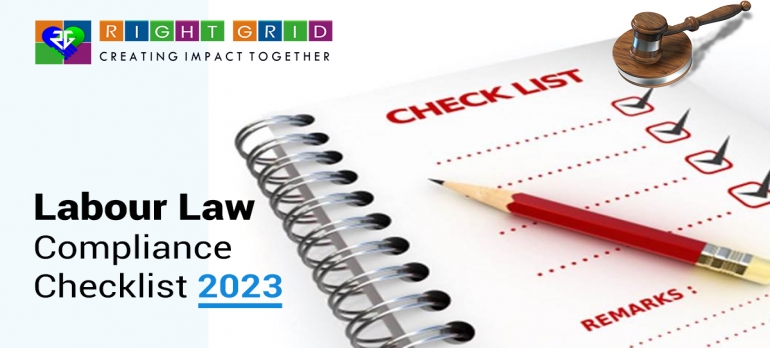
Labour Law Compliance Checklist 2023
Labour laws play a crucial role in safeguarding the rights and interests of both employers and employees. As we step into 2023, it's essential for businesses to stay updated and compliant with the latest labour regulations. Adhering to labour law requirements not only ensures legal compliance but also promotes a harmonious and productive work environment. In this blog post, we present a comprehensive Labour Law Compliance Checklist for 2023, helping employers navigate through the intricacies of labour laws and stay on the right side of the law.
Employment Contracts and Policies:
Review and update employment contracts to comply with current labour laws.
Ensure all mandatory clauses are included, such as terms of employment, compensation, working hours, and leave entitlements.
Develop or update employee policies, including anti-discrimination, harassment, and code of conduct.
Minimum Wage and Overtime:
Stay informed about the minimum wage requirements for your region and industry.
Comply with overtime regulations, including overtime pay rates, maximum working hours, and mandatory breaks.
Work Health and Safety:
Conduct a thorough risk assessment to identify and address workplace hazards.
Provide appropriate safety equipment and training to employees.
Regularly review and update safety protocols and emergency procedures.
Leave Entitlements:
Familiarize yourself with the statutory leave entitlements, such as annual leave, sick leave, maternity/paternity leave, and compassionate leave.
Ensure accurate record-keeping of employee leave balances and granting leave requests.
Employee Benefits and Social Security:
Comply with mandatory employee benefits, such as provident fund, health insurance, and pension schemes.
Stay updated on changes to social security contributions and ensure timely payments.
Working Time Regulations:
Understand and adhere to regulations regarding working hours, rest intervals, and weekly offs.
Implement proper shift scheduling and overtime management systems.
Anti-Discrimination and Equal Opportunity:
Promote a workplace free from discrimination, harassment, and bias.
Develop policies and practices that ensure equal opportunity for all employees, regardless of gender, race, religion, or disability.
Record-Keeping and Documentation:
Maintain accurate and up-to-date employee records, including contracts, attendance, leaves, and performance evaluations.
Safeguard confidential employee information and comply with data protection laws.
Trade Union and Collective Bargaining:
Familiarize yourself with laws regarding trade unions and collective bargaining, if applicable.
Respect employees' rights to join or form trade unions and engage in collective bargaining activities.
Compliance Audits and Regular Updates:
Conduct periodic internal audits to assess compliance with labour laws.
Stay informed about legislative changes and update policies and practices accordingly.
Conclusion:
Staying compliant with labour laws is essential for businesses to operate ethically, maintain employee satisfaction, and avoid legal consequences. By following the Labour Law Compliance Checklist for 2023, employers can proactively create a harmonious work environment, protect employee rights, and foster long-term success. Remember, labour law compliance is an ongoing process, and it's crucial to stay updated with the ever-evolving legal landscape to ensure a thriving and compliant workplace.
